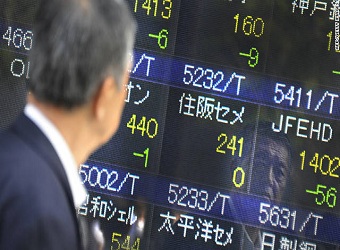Asia stock markets traded mostly higher on Thursday, tracking gains in the U.S. where the Dow Jones industrial average ended above 21,000 and the dollar rose amid growing expectations for an interest rate hike in March.
In Japan, the Nikkei 225 closed up 171.26 points, or 0.88 percent, at 19,564.80, while the Topix gained 11.60 points, or 0.75 percent, to 1,564.69.
Most exporters advanced, boosted by a relatively weaker yen. Honda shares rose 0.62 percent, Sony was up 1.53 percent and Canon gained 1.31 percent. Toyota shares gave up early gains to close nearly flat.
The yen traded at 114.16 to the dollar at 4:06 p.m. HK/SIN, weakening from levels below 112.0 reached earlier this week.
Toshiba shares rose 2.7 percent, following reports that Taiwanese manufacturer Foxconn was planning to bid for the Japanese conglomerate’s chip business. Last year, Foxconn acquired Japanese electronics company Sharp.
Across the Korean Strait, the Kospi gained 11.01 points, or 0.53 percent, to 2,102.65 after South Korean markets were closed Wednesday for a public holiday. In Hong Kong, the Hang Seng index finished lower by 48.42 points, or 0.2 percent, at 23,728.07.
Chinese mainland markets also fell behind regional peers; the Shanghai composite closed down 16.36 points, or 0.5 percent, at 3,230.57, while the Shenzhen composite fell 11.15 points, or 0.55 percent, to 1,997.71.
In Australia, the ASX 200 closed up 71.79 points, or 1.26 percent, at 5,776.58, with the heavily-weighted financial sector gaining 1.26 percent.
Banking stocks around the region advanced, with Japan’s Mitsubishi UFJ climbing 1.98 percent and Mizuho gaining 1.33 percent, while South Korea’s DGB Financial rose 2.4 percent.
Major Australian banks gained more than 1 percent each — shares of ANZ rose 1 percent, Commonwealth Bank of Australia was up 1.27 percent, Westpac added 1.03 percent and the National Australia Bank gained 1.06 percent.
Higher interest rates can boost banks’ earnings as the spread between their lending and deposit rates can widen.
The dollar index rose to 101.85 at 4:17 p.m. HK/SIN, climbing from levels near 100.8 earlier in the week. The greenback’s rise is boosted by growing expectations that the U.S. Federal Reserve could next raise interest rates as early as this month.
“Markets now put an 80 percent probability of a March hike, more than double the odds of one week ago,” according to analysts at Singapore’s DBS Bank. The analysts said the main driver was New York Fed President William Dudley’s comments earlier in the week
Dudley, a close ally of Fed Chair Janet Yellen, said on CNN International Tuesday afternoon that the “case for monetary tightening has become more compelling.”
The latest to join the call for hiking rates soon was Fed Governor Lael Brainard.
Meanwhile, traders also digested President Donald Trump’s remarks to lawmakers on Tuesday and some analysts attributed the global rally in stocks to his speech.
“The U.S. president’s re-iteration of a commitment to a massive infrastructure spend and tax reform inspired gains, but some commentators cited the controlled tone of the speech as a key driver,” said Michael McCarthy, chief market strategist at CMC Markets.
He said the rally in the U.S. is “remarkable” given the increasing probability of a Fed rate hike in March. “The equity market’s enthusiasm stands in contrast to currency trading, which is oddly becalmed.”
In the broader currency market, the Australian dollar fell 0.25 percent to $0.7655 Wednesday afternoon. The euro traded lower at $1.0531, while the pound was down 0.13 percent to $1.2277.
British Prime Minister Theresa May’s Brexit plan suffered a setback on Wednesday after the upper parliamentary house voted for a change to her strategy that says she can only begin negotiations for Brexit if she promises to protect EU citizens’ rights, reported Reuters.
Oil prices declined Thursday, with U.S. crude down 0.45 percent at $53.59 a barrel at 4:22 p.m. HK/SIN and the global benchmark Brent declined 0.25 percent to $56.22.
Gold prices also fell on the back of a stronger dollar, with spot gold down 0.28 percent at $1,245.42 an ounce.
Jeffrey Halley, senior market analyst at OANDA, said in a note that a break from the $1,246 level should “see more selling emerge as short term traders head for the door.”
He added that stronger equities, the possibility of the Fed raising interest rates in March and dollar strength are weighing on gold’s appeal.
Source: CNBC
